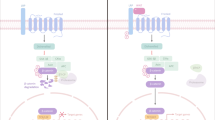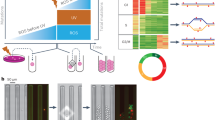Abstract
The p53 tumor suppressor serves as a crucial barrier against cancer development. In tumor cells and their progenitors, p53 suppresses cancer in a cell-autonomous manner. However, p53 also possesses non-cell-autonomous activities. For example, p53 of stromal fibroblasts can modulate the spectrum of proteins secreted by these cells, rendering their microenvironment less supportive of the survival and spread of adjacent tumor cells. We now report that epithelial tumor cells can suppress p53 induction in neighboring fibroblasts, an effect reproducible by tumor cell-conditioned medium. The ability to suppress fibroblast p53 activation is acquired by epithelial cells in the course of neoplastic transformation. Specifically, stable transduction of immortalized epithelial cells by mutant H-Ras and p53-specific short inhibitory RNA endows them with the ability to quench fibroblast p53 induction. Importantly, human cancer-associated fibroblasts are more susceptible to this suppression than normal fibroblasts. These findings underscore a mechanism whereby epithelial cancer cells may overcome the non-cell-autonomous tumor suppressor function of p53 in stromal fibroblasts.
This is a preview of subscription content, access via your institution
Access options
Subscribe to this journal
Receive 50 print issues and online access
$259.00 per year
only $5.18 per issue
Buy this article
- Purchase on Springer Link
- Instant access to full article PDF
Prices may be subject to local taxes which are calculated during checkout




Similar content being viewed by others
References
Bar J, Cohen-Noyman E, Geiger B, Oren M . (2004). Attenuation of the p53 response to DNA damage by high cell density. Oncogene 23: 2128–2137.
Buckbinder L, Talbott R, Velasco-Miguel S, Takenaka I, Faha B, Seizinger BR et al. (1995). Induction of the growth inhibitor IGF-binding protein 3 by p53. Nature 377: 646–649.
Campbell IG, Qiu W, Polyak K, Haviv I . (2008). Breast-cancer stromal cells with TP53 mutations. N Engl J Med 358: 1634–1635; author reply 1636.
Dudley AC, Shih SC, Cliffe AR, Hida K, Klagsbrun M . (2008). Attenuated p53 activation in tumour-associated stromal cells accompanies decreased sensitivity to etoposide and vincristine. Br J Cancer 99: 118–125.
Elenbaas B, Weinberg RA . (2001). Heterotypic signaling between epithelial tumor cells and fibroblasts in carcinoma formation. Exp Cell Res 264: 169–184.
Hawsawi NM, Ghebeh H, Hendrayani SF, Tulbah A, Al-Eid M, Al-Tweigeri T et al. (2008). Breast carcinoma-associated fibroblasts and their counterparts display neoplastic-specific changes. Cancer Res 68: 2717–2725.
Kalluri R, Zeisberg M . (2006). Fibroblasts in cancer. Nat Rev Cancer 6: 392–401.
Karnoub AE, Dash AB, Vo AP, Sullivan A, Brooks MW, Bell GW et al. (2007). Mesenchymal stem cells within tumour stroma promote breast cancer metastasis. Nature 449: 557–563.
Kiaris H, Chatzistamou I, Trimis G, Frangou-Plemmenou M, Pafiti-Kondi A, Kalofoutis A . (2005). Evidence for nonautonomous effect of p53 tumor suppressor in carcinogenesis. Cancer Res 65: 1627–1630.
Komarova EA, Diatchenko L, Rokhlin OW, Hill JE, Wang ZJ, Krivokrysenko VI et al. (1998). Stress-induced secretion of growth inhibitors: a novel tumor suppressor function of p53. Oncogene 17: 1089–1096.
Kurose K, Gilley K, Matsumoto S, Watson PH, Zhou XP, Eng C . (2002). Frequent somatic mutations in PTEN and TP53 are mutually exclusive in the stroma of breast carcinomas. Nat Genet 32: 355–357.
Logunov DY, Scheblyakov DV, Zubkova OV, Shmarov MM, Rakovskaya IV, Gurova KV et al. (2008). Mycoplasma infection suppresses p53, activates NF-kappaB and cooperates with oncogenic Ras in rodent fibroblast transformation. Oncogene 27: 4521–4531.
Milyavsky M, Shats I, Erez N, Tang X, Senderovich S, Meerson A et al. (2003). Prolonged culture of telomerase-immortalized human fibroblasts leads to a premalignant phenotype. Cancer Res 63: 7147–7157.
Moskovits N, Kalinkovich A, Bar J, Lapidot T, Oren M . (2006). p53 Attenuates cancer cell migration and invasion through repression of SDF-1/CXCL12 expression in stromal fibroblasts. Cancer Res 66: 10671–10676.
Olumi AF, Grossfeld GD, Hayward SW, Carroll PR, Tlsty TD, Cunha GR . (1999). Carcinoma-associated fibroblasts direct tumor progression of initiated human prostatic epithelium. Cancer Res 59: 5002–5011.
Patocs A, Zhang L, Xu Y, Weber F, Caldes T, Mutter GL et al. (2007). Breast-cancer stromal cells with TP53 mutations and nodal metastases. N Engl J Med 357: 2543–2551.
Radisky D, Hagios C, Bissell MJ . (2001). Tumors are unique organs defined by abnormal signaling and context. Semin Cancer Biol 11: 87–95.
Tan M, Wang Y, Guan K, Sun Y . (2000). PTGF-beta, a type beta transforming growth factor (TGF-beta) superfamily member, is a p53 target gene that inhibits tumor cell growth via TGF-beta signaling pathway. Proc Natl Acad Sci USA 97: 109–114.
Tlsty TD . (2001). Stromal cells can contribute oncogenic signals. Semin Cancer Biol 11: 97–104.
Vousden KH, Lane DP . (2007). p53 in health and disease. Nat Rev Mol Cell Biol 8: 275–283.
Wernert N, Locherbach C, Wellmann A, Behrens P, Hugel A . (2001). Presence of genetic alterations in microdissected stroma of human colon and breast cancers. Anticancer Res 21: 2259–2264.
Acknowledgements
We thank Dr J Schachter and Dr B Kaufman for helpful discussions. This work was supported in part by a Center of Excellence grant from the Flight Attendant Medical Research Institute (FAMRI), and by grant R37 CA40099 from the National Cancer Institute. JB was supported also by the Koschitzky family donation to the breast cancer unit of CSMC, and by a Van Bates grant from the Tel Aviv University Cancer Biology Research Center.
Author information
Authors and Affiliations
Corresponding author
Rights and permissions
About this article
Cite this article
Bar, J., Feniger-Barish, R., Lukashchuk, N. et al. Cancer cells suppress p53 in adjacent fibroblasts. Oncogene 28, 933–936 (2009). https://doi.org/10.1038/onc.2008.445
Received:
Revised:
Accepted:
Published:
Issue Date:
DOI: https://doi.org/10.1038/onc.2008.445
Keywords
This article is cited by
-
Do locally advanced and metastatic human epithelial cancers evolve in ‘placental/decidual-like microenvironments’?
Clinical and Translational Oncology (2019)
-
Induction of IL-25 secretion from tumour-associated fibroblasts suppresses mammary tumour metastasis
Nature Communications (2016)
-
Genetic instability in the tumor microenvironment: a new look at an old neighbor
Molecular Cancer (2015)
-
Mutant p53 gains new function in promoting inflammatory signals by repression of the secreted interleukin-1 receptor antagonist
Oncogene (2015)
-
Glioblastoma cells inhibit astrocytic p53-expression favoring cancer malignancy
Oncogenesis (2014)



